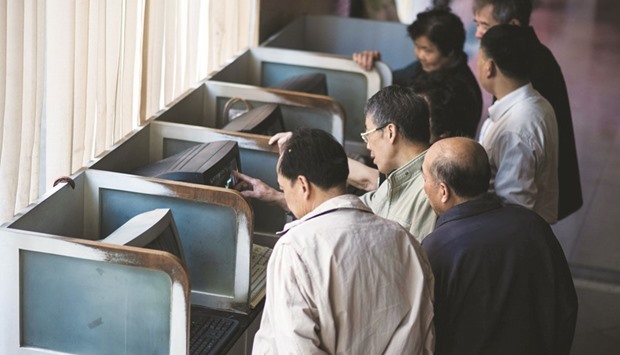Chinese stocks will extend gains beyond a recent bull rally, supported by a strengthening economy and improving corporate earnings.
That’s the view of four equity strategists and analysts interviewed by Bloomberg. Tebon Securities Co predicts that the Shanghai Composite Index will erase the year’s losses and climb as much as 9.6% to 3,500 by the end of December, while Central China Securities Co sees a level of 3,600 in three to six months. The equity benchmark closed at 3,192.86 on Friday, after entering a bull market on November 11.
The forecasts follow a string of data showing that the world’s second-largest economy is stabilising, with a manufacturing gauge climbing to a two-year high and producer prices rising at the fastest pace since 2011. Premier Li Keqiang said this week that China will be able to meet full-year economic targets. The nation’s industrial profits climbed 8.4% in the first nine months of 2016 from a year earlier, the fastest pace since 2014.
“The stabilising economy, with producer prices turning positive, will help improve corporate earnings into at least the first quarter of next year,” said Zhang Guoyu, an analyst at Tebon Securities in Shanghai. “But a lack of further stimulus could limit the upside.”
While the improving economy is boosting investor sentiment, it is also reducing the need for policy makers to add stimulus. The nation’s one-year interest-rate swaps are trading near the highest level since April 2015, suggesting that traders expect the People’s Bank of China to refrain from lowering borrowing costs. The yuan has been a drag on Chinese assets as well, accelerating declines to an eight-year low amid an advance in the dollar after Donald Trump’s victory in the US presidential election.
Wang Qing, an analyst at Yuanta Securities Co, had the least optimistic view for the Shanghai Composite, saying it is likely to trade near 3,200 for some time before trying 3,300. US President-elect Donald Trump’s opposition to the Trans- Pacific Partnership - which leaves out China - could benefit infrastructure stocks, Wang added.
The Shanghai Composite fell 0.1% this week, while the Hang Seng Index was headed for a 0.8% decline. The Hang Seng China Enterprises Index retreated 0.8 this week.
“With the economy stabilising and market environment turning better, domestic factors are helping support local shares,” said Gao Ting, head of China strategy at UBS Securities Co. “Trump’s policies on the US economy and China aren’t clear yet. So they’re neutral for A shares at the moment.”

Investors follow financial information at a securities brokerage in Shanghai. Chinese stocks will extend gains beyond a recent bull rally, supported by a strengthening economy and improving corporate earnings, according to equity strategists and analysts interviewed by Bloomberg.
